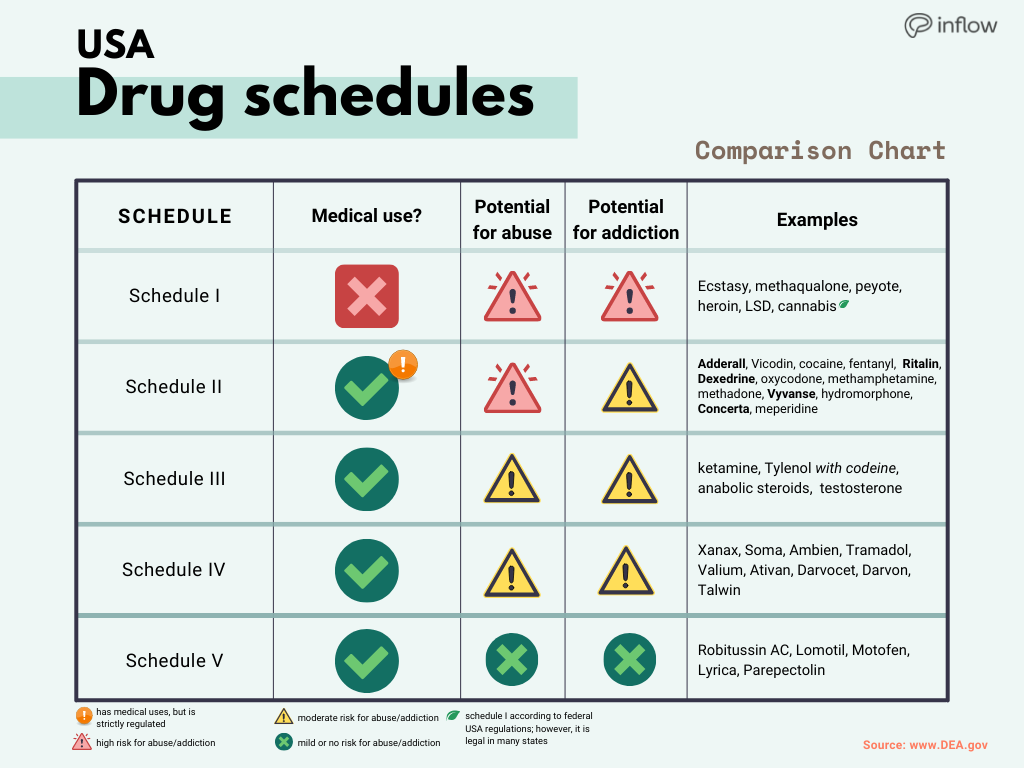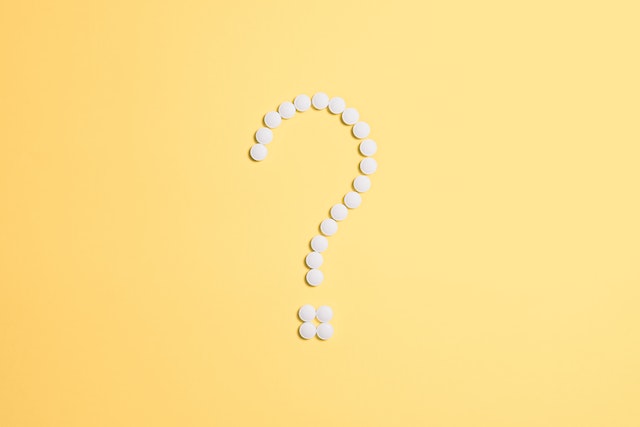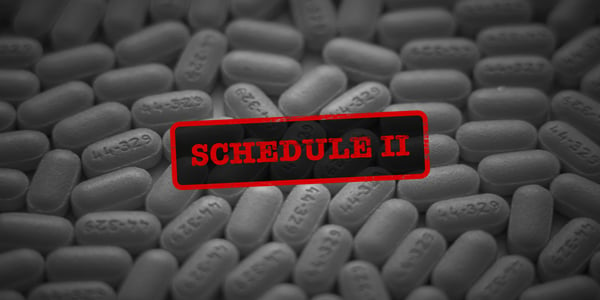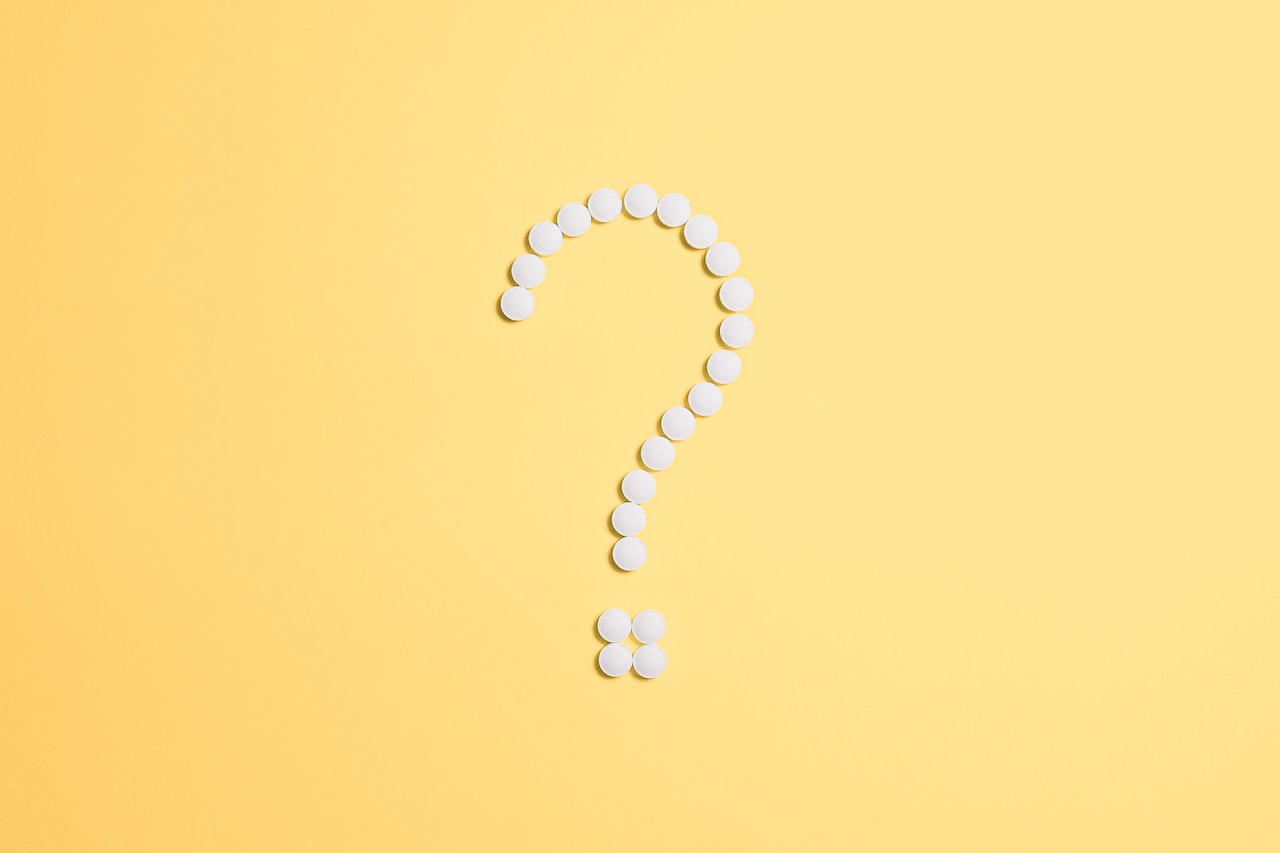If you have a prescription for Adderall or another ADHD stimulant, you know that refilling it can be an annoying process, to say the least. Since it’s a controlled substance, you can’t refill it online; you have to actually speak to a pharmacist. (I know. Awful, right?)
Laws vary based on where you live, but you may only be able to receive three months worth of your prescription before needing to see your doctor again. And for some people, they have to do this every month. These extra steps are necessary because Adderall (and Vyvanse, Concerta, Dexedrine, and Ritalin) is classified as a controlled substance.
Disclaimer: I’m not a doctor. This is for informational and educational purposes only. Do not disregard medical or professional advice, or delay seeking it, because of something you read on this website.
Too long; didn’t read
- Adderall and other stimulant meds are classified as schedule II drugs because they have a high potential for dependency and abuse.
- Someone who doesn’t have ADHD can technically 'get high' off of Adderall
- There are serious side effects—some of which are life-threatening—that can arise when taking stimulant medications, even when taking the prescribed amount
What are controlled substances?
Substance control is designed to protect people. Limits on prescription drug procedures and sales are thanks to the Controlled Substances Act of 1970. This act manages and classifies the distribution of medications and allows the United States government to regulate drugs.
The controlled substance act lists chemicals used to manufacture controlled substances, and outlines legal—and illegal—drug manufacturing, distribution, and possession.
It also places drugs into classifications, or schedules, based on their risk for abuse and whether there are approved medical uses for the drug.
What are drug schedules?

Is Adderall a controlled substance?
Substances identified as Schedule I drugs have a high potential for abuse and dependence and higher numbers represent less potential for abuse and dependence. Adderall and other ADHD medications are classified as schedule II drugs, meaning they “have high potential for abuse which may lead to severe psychological or physical dependence.”
Why is my ADHD medication controlled?
Experts believe ADHD is linked to lower activity in the brain's prefrontal cortex. Taking Adderall stimulates this brain area.
For people with ADHD, these meds are intended to have a calming effect to help them manage inattention, impulses, and hyperactivity. Someone without ADHD who takes Adderall will likely feel 'high' from it and have a sense of euphoria.
Adderall is especially susceptible to dependency, abuse, and addiction. The body develops a tolerance for the medication and requires higher and higher doses to achieve the same, desired effects. This causes a dependency on the drug.
What are the possible side effects of Adderall?

Adderall can be life-changing for people with ADHD by helping with organization, task completion, concentration, and hyperactivity. However, it also carries potential side effects, including anxiety, insomnia, dry mouth, and mood swings. Additionally, it's hard to avoid the medication rebound that comes with most stimulant medications.
How does Adderall affect someone without ADHD?
For people without ADHD, Adderall can increase levels of dopamine too much, causing euphoria, paranoia, mania, hallucinations, or psychosis.
Withdrawal from Adderall can cause panic attacks, abdominal pain, and fatigue.
Other serious, long-term effects of stimulant abuse include:
- Serious cardiovascular events (heart attacks)
- Psychiatric adverse events (panic attacks)
- Aggression or violence
- Long-term suppression of physical growth
- Seizures
- Overdose
What we’re trying to say is…
Adderall is a serious drug with a lot of limitations to keep people safe. If you have a prescription, don’t share your medication with anyone, no matter how much they offer. If caught, you could end up in more trouble than the person you give it to.
Outside of the serious legal stuff, Adderall can be really dangerous if you don’t know what you’re doing, and sharing meds could cause someone to have a panic attack of go into cardiac arrest. Don’t feel like you’re being a party-pooper. You could be saving your friend’s life.
Getting help for Adderall addiction
The longer you abuse Adderall, the stronger your addiction can become. The withdrawal symptoms that start shortly after quitting can make it hard to stop on your own.
The National Drug Helpline is for anyone dealing with addiction issues, including family and loved ones.
Professionals are available to help 24/7/365 at 1-844-289-0879.
Frequently Asked Questions

What does ‘schedule 2’ mean?
Schedule 2 drugs have a high risk for abuse, but can also greatly improve certain medical conditions. Adderall, Vyvanse, Concerta, and Ritalin are all schedule 2 drugs — to name a few.
What’s the difference between schedule 1 and schedule 2 drugs?
Both schedule 1 and schedule 2 drugs have high risk for abuse. However, schedule 2 drugs can treat certain conditions, whereas schedule 1 drugs have no medical benefits.
Examples of schedule 1 drugs include heroin, LSD, and cocaine.
Is it illegal to carry ADHD medications?
Don’t worry, it’s not illegal to carry your own ADHD medication. Some states require medication to remain in its original bottle, though.
Protect yourself when carrying your own medications by knowing the laws in your state and having a copy of your prescription when traveling.
Is Adderall addictive?
Because it’s an amphetamine and associated with pleasure and reward centers of the brain—due to its effects on dopamine—Adderall can be habit-forming and lead to dependency or addiction.
Where do I find help for an Adderall addiction?
If you’re in need of support for an amphetamine addiction, you’re not alone! Here are a few (confidential) resources you can explore, based on your region:
United States:
- SAMHSA’s National Helpline
- American Addiction Centers - Adderall Hotline
- The Recovery Village - Adderall Hotline
United Kingdom:
Canada:








